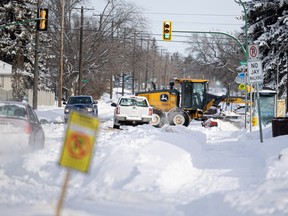Saskatoon finished last year with a surplus of nearly $10 million and council must balance prudence and popularity in spending it.

Article content
The irony is piled as deep as the snow that smothered Saskatoon this weekend.
Last week, the City of Saskatoon’s chief financial officer Clae Hack revealed the city finished last year with a surplus of $9.9 million — due largely to higher transit revenue than expected and less spending on snow removal.
Article content
Hack is recommending the extra money be used to replenish reserve funds that have been bled dry by the pandemic. That certainly sounds like the responsible fiscal strategy.
Advertisement 2
Article content
And the weekend snowstorm that left residents digging out from 35 centimetres of snow lends even more credibility to the practice of ensuring there’s future money for events this unpredictable and this expensive.
But Hack will not face election in the fall after imposing a six per cent property tax increase this year — the highest in a decade and reversing the practice of lower tax hikes in election years. Another increase of 5.64 per cent follows in 2025.
The temptation to use some of the surplus to provide tax relief to residents suffering amid high inflation will be enticing. And it should be.
It might qualify as popular more than prudent, but it’s worth at least considering, given the current environment.
According to an email response from Hack, it would take $2.9 million to reduce this year’s property tax increase by one per cent. If you used the entire $9.9 million of found money, you could slash the tax increase by more than three per cent.
But that creates future issues. If you used the surplus to reduce this year’s property tax increase by, say, one per cent, you would need to make that up next year by the same amount. That makes it difficult to escape a six per cent hike, either this year or next.
Article content
Advertisement 3
Article content
But council has adjusted the budget mid-year before. In 2017, after the province unexpectedly slashed grants to municipalities, city hall increased the tax hike by nearly one per cent. It reduced the tax hike the following year when the province restored the funds.
City council’s finance committee will consider the surplus on Wednesday.
The city spent $5.7 million less than expected last year on snow and ice management, which will not surprise anyone who recalls the brown Christmas a couple of months ago.
Hack explained in his email reply that the city budgets for five or six snow events each year. In the current year, we have already sustained five events, including the whopper this weekend.
Some will remember that last year, council approved borrowing $13 million through an internal loan to cover the costs of snow clearing in 2022, which reached $18 million.
In this light, Hack recommends the $5.7-million share of the surplus be deposited in a reserve fund to use to cover future snow and ice management deficits.
Hack also suggests the remaining $4.2 million be sent to a reserve fund to cover future budget deficits.
Advertisement 4
Article content
But the other big driver of the surplus came from higher-than-expected revenue from more people than expected riding the bus. That accounts for an extra $3.5 million.
That extra ridership is linked to the 14,000 more people who called Saskatoon home last year, pushing the city’s population above 300,000.
Regardless of the reason, an increase in transit ridership and revenue ranks as exceptionally good news, given that declining public transit ridership and the resulting drop in fares has created severe issues throughout Canada and beyond.
That increase in transit revenue could be permanent and that’s worth pondering, particularly as Saskatoon gets set to launch a bus rapid transit style transformation later this decade.
Few could argue with the logic behind Hack’s recommendations, but many residents will only see $10 million in extra money and a six per cent tax hike. Maybe there’s room for a more creative solution to balance fiscal prudence with tax relief.
Inflation has hit many municipalities hard, with Calgary and Edmonton imposing higher property tax increases this year than Saskatoon. But Regina settled on 2.85 per cent.
That’s the reality in which Saskatoon politicians must operate.
Phil Tank is the digital opinion editor at the Saskatoon StarPhoenix.
Recommended from Editorial
Our website is your destination for up-to-the-minute Saskatoon news, so make sure to bookmark TheStarPhoenix.com and sign up for our newsletters so we can keep you informed. Click here to subscribe.
Article content





